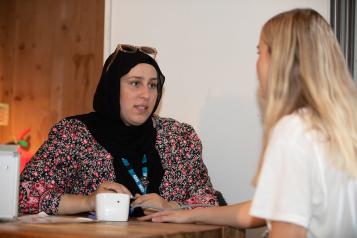Perspectives on primary care part 2: British Pakistani women

One of the main ways that people interact with the NHS is through primary care services, such as their GP.
Official figures show that 85 percent of people are satisfied with the services they receive, but as our previous research has shown, this doesn’t always tell the whole story.
Based on our conversations with women from the Pakistani community in Waltham Forest, we found that satisfaction with the care GPs provide is high, but many thought it could be better.
Some of the issues they shared such as difficulties booking GP appointments are common, but there are also a number of specific needs that were raised in our discussions.
Here is what they said:
Making an appointment with a GP isn’t easy
They shared frustrations about trying to book an appointment with their GP. They told us about short time frames in which to book appointments, queues outside GP practices in the morning and long waits for routine appointments.
Urdu speaking GPs helps people access the care they need
Urdu speaking GPs made a big difference as it enabled people to explain their problems themselves, rather than having to rely on a family member to speak for them:
“[…]in Walthamstow there is a lot of Asian GPs […] It’s quite easy to get somebody that’s Urdu speaking”.
Source - patient speaking to Healthwatch Waltham Forest
The women we spoke to felt that although they didn’t mind relying on family members to interpret when necessary, Urdu speaking GPs was ideal.
One woman we spoke to had to interpret for a pregnant aunt when she was ten, she felt this couldn’t have been the best thing for her aunt, as she didn’t even know what pregnancy was at the time.
Inconsistency in charges for vaccinations and certificates is frustrating
The women we spoke to found that GP practices were charging different rates for vaccinations and certificates. They felt that GPs shouldn’t be making money out of patients with charges like these: “we needed the meningitis certificate before we get the visa. […] everything put together was £35 per person, right, okay fair enough, so my brother goes to his GP [and it’s] £25.”
Being able to book an appointment with a female doctor is important
Some of the women we spoke to felt that there were some things they only wanted to discuss with a female doctor, especially when they needed to show a body part.
Pharmacies should offer private rooms where they can
They told us they didn’t link having to discuss symptoms at the counter, especially if private rooms are available: “This is not where I should be standing, giving my daughters medical information […]you’re asking what her problem is in public […] you should have taken me to the private room before we are having that conversation”
The solution
What this conversation highlights is that the needs of every group vary and the importance of primary care professionals taking the time to find out what their patients really want from services
Most people certainly want to share their views. Eight in ten people we polled said that they would be interested in sharing their views of services to help improve them.
Asking people in more detail about their experiences can identify the issues that if addressed could make services better, as well as great ideas about what future services could look like.
Find out more
Read more about what people told us about their experiences of primary care services.


